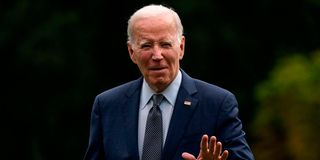
US President Joe Biden.
President Joe Biden's visit to Angola is seen as a diplomatic victory for Angola, and also as an opportunity for Luanda to settle scores with various internal sectors in order to improve its human rights outlook.
Biden decided last week to visit Angola next month, his first trip to Africa as US president and certainly his last as he will not be defending his seat in November's elections. When he hosted Kenya's President William Ruto in May, he had indicated that he would visit Africa starting in January. Political events in Washington, including pressure from his party to quit the race, may have changed that plan.
Still, Angola may get a big stage on which to market itself as a thriving democracy despite being roasted by rights activists.
Last week, Amnesty International called on the Angolan authorities to immediately release four activists who have been unjustly detained for a year and whose health has deteriorated drastically in prison.
Earlier, Human Rights Watch also raised the bar, saying that President João Lourenço had signed into law two bills that fail to meet international human rights standards and will severely restrict freedom of the media, expression, and association.
The two calls mean that Angola must improve its human rights record. But Angola isn't a bad place in Washington's eyes. It has identified Luanda as a key pillar of the Lobito Corridor, a multibillion-dollar infrastructure project that the US and its allies want to use to compete with China for minerals in Angola, the Democratic Republic of Congo and Zambia.
The White House referred to the Project in a dispatch about the visit due on October 13-15, and also alluded to issues of democracy. The two leaders, it said, will discuss increased collaboration on shared priorities, including bolstering our economic partnerships “that keep our companies competitive and protect workers; celebrating a signature project of the G7’s Partnership for Global Infrastructure and Investment (PGI), which advances our joint vision for Africa’s first trans-continental open-access rail network that starts in Lobito and ultimately will connect the Atlantic Ocean to the Indian Ocean; strengthening democracy and civic engagement; intensifying action on climate security and the clean energy transition; and enhancing peace and security.”
Civil society in Angola could use a meeting with President Biden to see if he can personally encourage President Lourenço to promote certain improvements in the area of democracy and human rights, said Mr José Gama, a political commentator.
Despite this reality, Angolan diplomats have reason to rub their hands with glee.
This will be Biden's first visit to Africa as US President and the first ever by an American leader to Angola since independence from Portugal in 1975.
The visit comes at a time when Angola is preparing to host the US-Africa Business Summit mid next year, which is expected to bring together more than 1,500 delegates, heads of state and government, and other world leaders.
According to commentators in Luanda, this signals growing US interest in Angola and a certain advantage over China and Russia.
Angola is China’s biggest debtor in Africa, and Russia was the country’s largest arms supplier during the civil war and the bastion for training its top army generals.
In November last year, President Biden hosted President Lourenço at the White House, a meeting that marked 30 years of diplomatic relations between the two countries.
Osvaldo Mboco, a political commentator in Luanda, said that President Biden's visit to Angola was a gain for the country's diplomacy, but that it also expressed "Angola's importance in Africa and in the world".
For Mboco, this means that President Lourenço's vision and strategy are being celebrated by other countries, and that it is crucial for Angola to be prepared for possible changes in the dynamics of its bilateral cooperation with the US, according to an analysis he gave to state television TPA in Luanda.
But even before the official announcement of the visit by the White House, the trip was already being discussed on traditional and social media, with the US Mission in Luanda calming speculation last week by saying that only Washington could confirm it.
On Tuesday, the White House put an end to the speculation, causing even more excitement on social media.
The Angolan presidency, for its part, insisted that the Lobito Corridor, its full development and expansion, as well as peace and security, would be on the minds of both presidents.
VOA Radio suggested that the leaders of the Democratic Republic of Congo and Zambia were expected to attend the meeting between President Lourenço and Biden, as they are directly involved in the Lobito Corridor.
The development of the Lobito Corridor is a multinational partnership that will help spur economic development through investment in the DRC, Zambia and Angola.
According to the US Department of State, in less than 18 months since the initial US commitment, more than $3 billion has been committed to the development of the corridor through investments in several interrelated sectors, including transportation and logistics, agriculture, clean energy, health, and digital access.
“The US is deeply invested in the success of the Lobito Corridor project. Through significant financial assistance, we are demonstrating our commitment to infrastructure development and economic growth in Africa,” said Mr William Butterfield, USAID representative in Angola, on Wednesday.
In January, US Secretary of State Anthony Blinken reviewed progress on the Lobito Corridor when he visited Angola.
According to the US government, US exports to Angola in 2023 were $595 million, down 8.8 percent ($58 million) from 2022 and down 59 percent from 2013 while its imports from Angola totalled $1.2 billion in 2023, down 26.8 percent ($428 million) from 2022, and down 87 percent from 2013.
Angola is Africa’s second-largest oil producer and one of the continent’s fastest growing economies. But the country the country has been facing a severe economic crisis since 2015, triggered by the oil price slump.
